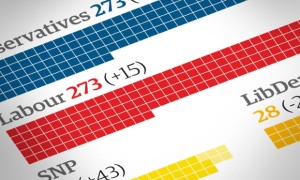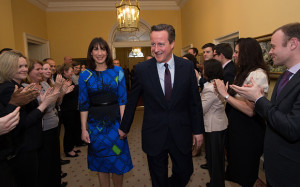The reason for the shock, of course, is that polls had Labour either winning or, at the very least, fighting the Conservatives down to the last seat.
Truth be told, far too many politicians and reporters treat pollsters like soothsayers these days. And no pollster cultivates this treatment more than Nate Silver – whose FiveThirtyEight analytics attained crystal-ball status at no less a newspaper than the New York Times.
This is why today’s FiveThirtyEight headline, which greeted those who rely on his prognostications so religiously, must have constituted the biggest humble pie Silver has ever had to eat:
What We Got Wrong In Our 2015 U.K. General Election Model
 And, lest you dismiss this as just a presumptuous American pollster getting his just desserts, here is how the respected Guardian of London crystallized the prognostications of UK pollsters in a special report on January 28:
And, lest you dismiss this as just a presumptuous American pollster getting his just desserts, here is how the respected Guardian of London crystallized the prognostications of UK pollsters in a special report on January 28:
Exclusive Guardian analysis of current polling suggests main two parties [Conservatives and Labour] are neck-and-neck and would have to create a multi-party alliance to form a stable government.
Well, reality bites:
David Cameron has promised to lead a government for ‘one nation’ and make ‘Great Britain greater’ as he returned to Downing Street as prime minister…
Mr Cameron’s rivals Ed Miliband [Labour], Nick Clegg [LibDems] and Nigel Farage [Ukip] have all resigned after election disappointment…
With all 650 seats declared, the Conservatives have ended up with 331 seats in the House of Commons, 24 more than in 2010 [and 5 more than they needed to form a government outright]. Labour have 232, the LibDems 8, the SNP 56, Plaid Cymru 3, UKIP 1, the Greens 1 and others 19.
(BBC News, May 8, 2015)
Having said that, it would be remiss of me not to acknowledge that a number of you inquired why I wasn’t writing any commentaries on the campaign — complete with my own prognostications about the results. So let me take this opportunity to share the decision I made, after the 2012 U.S. presidential election, to stop writing such commentaries.
Perhaps the best way to explain this is to allude to a worker at a sausage factory deciding that, in order to retain any taste for hot dogs, he can no longer have anything to do with the grinding process of making them. I hope the image this conjures up is not too … distasteful; but you get the point.
 Even so, I observed enough of the campaign to exchange text messages with a few friends, in which I predicted the Conservatives would win. Far more interesting (and verifiable), though, is what I predicted 10 years ago about David Cameron as the Conservatives’ answer to Labour’s Tony Blair.
Even so, I observed enough of the campaign to exchange text messages with a few friends, in which I predicted the Conservatives would win. Far more interesting (and verifiable), though, is what I predicted 10 years ago about David Cameron as the Conservatives’ answer to Labour’s Tony Blair.
This very English man has all the right stuff to be the next Prime Minister of England. His name is David Cameron. He was elected as the new leader of the opposition Conservative Party yesterday, primarily because he’s every bit as young (at 39), telegenic, impudent, and glib as current PM Tony Blair was when he was catapulted to the leadership of the Labour Party at the politically precocious age of 41.
And, if they stick to their let’s-emulate-Labour’s-1994-to-1997 playbook (1997 being the year Blair upset incumbent PM John Major to win his first election), it’s very likely that the Conservatives will be returned to government – with Cameron moving into the Prime Minister’s residence at No. 10 Downing Street – after the next general elections.
(“The Next British Prime Minister?” The iPINIONS Journal, December 7, 2005)
Sure enough, much of the hindsight analyses political commentators are offering today attributes this “shocking” UK election result as much to Cameron’s formative decision to emulate Blair as to Miliband’s formative decision to disown him.
As for what it all means (not just for the UK, but for the U.S. and EU as well), I suspect much of the same – notwithstanding the historic gains by the SNP or the looming referendum on the EU. After all, the reason the LibDems got so eviscerated is that they spent the past five years in coalition with the Conservatives acting as if there were no differences in policies between them.
By the way, apropos of that referendum, am I the only one who thinks it reeks of hypocrisy that Eurosceptics in the UK are preparing to do to the EU, what they just begged and bribed Anglosceptics in Scotland not to do to the UK…? Which raises the existential question: will the EU be as desperate to keep the UK in its union, as the UK was to keep Scotland in its kingdom? I think not.
Others will have much more to say about all this, and you might think I do too. But, in light of my 2012 decision, I couldn’t possibly comment … any further.
Related commentaries:
Next British PM…
* This commentary was originally published yesterday, Friday, at 2:24 p.m.